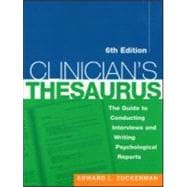Now in a revised and updated sixth edition, this perennially popular resource provides quick and handy access to the entire language of the mental health professions. More than a giant collection of synonyms, the book includes thousands of useful words, phrases, clinical tips, and interview questions to help practitioners conduct thorough assessments, accurately describe nearly any clinical situation, and shape raw data into effective reports. Updated for compliance with HIPAA privacy regulations, the sixth edition features easier-to-navigate, reorganized contents; numerous additional terms; matched listings for DSM-IV-TR and ICD-9 diagnostic criteria; many helpful website addresses; and much more--all in a large-size format with convenient lay-flat binding.








